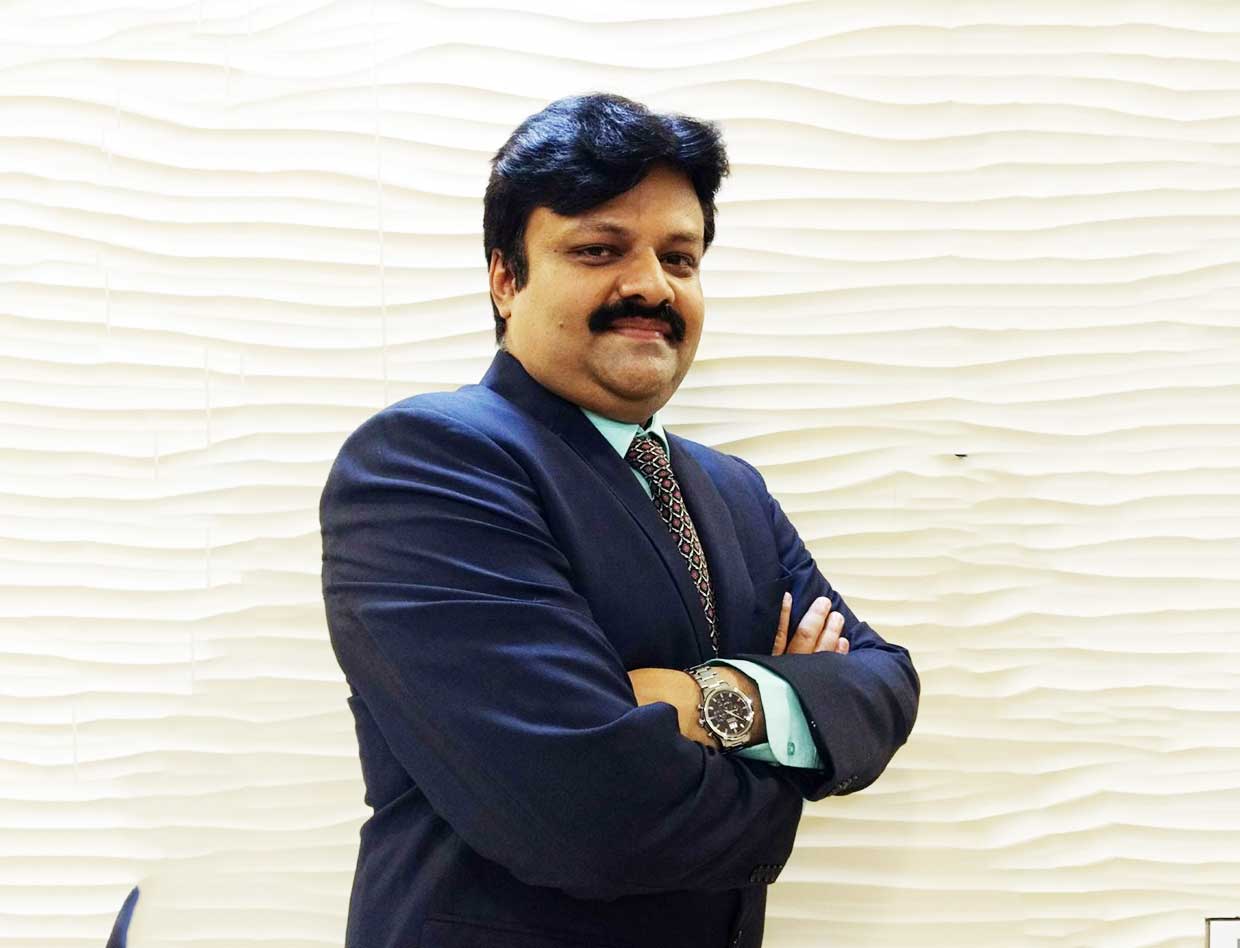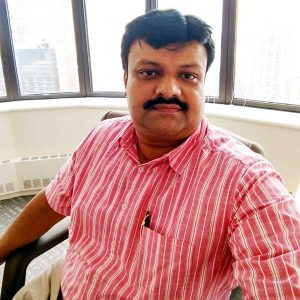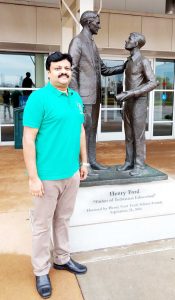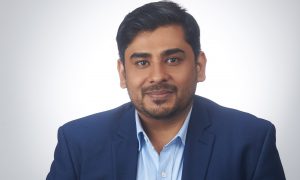Harish Nambiar graduated in Law from JSS Law College, Mysore in 1997. Harish has been exposed to seventeen years of comprehensive experience in the areas of: Legal Strategic Planning, Management, Consulting Compliance, Drafting & Vetting, Litigation, etc. He joined Syntel as General Manager – Legal and was promoted to Vice President in 2014. His role also includes managing the ethics and whistle-blower policies of Syntel.
Harish likes to be a practical and proactive lawyer with an inclination towards understanding relevant laws and underlying jurisprudence.
In this interview, he gives us his insights to:
- Being a first generation lawyer.
- Constructively utilizing time at law school.
- His areas of expertise and how did he go about developing them?
- His important message to young law graduates.
How would you like introduce yourself to our readers?
I am Vice President – Legal at Syntel, a global IT multinational corporation. As a lawyer, I have always been an in-house counsel, starting from my first corporate assignment with a large IT company in 2000. I have worked in IT companies and insurance companies. Of my total seventeen to eighteen years in corporate assignments, I have been in senior leadership position (AVP and above) for about twelve years. I am interested in Law related to contracts, property, employment, crimes, IPR, and anti-harassment. However, as an in-house counsel, there is really no limitation on what kind of matters may come up and what range of Laws will have to be applied. On personal side, I am very passionate about environment protection and planting trees. I like driving and comedy movies. I am an avid reader and like reading anything that is available on Indian history – I have a collection of books. I also like to be associated with causes that support destitute children and underprivileged women.
Tell our readers a bit about your childhood and pre-college life as well as educational background.
Most of my childhood was spent in Mysuru, then known as Mysore. It is a beautiful place. I went to the St. Joseph’s School at Jayalakshmipuram in Mysore, Junior college was done in SBRR Mahajana Junior College, and I completed B.A, LL.B from JSS Law College (which was at that time affiliated to the University of Mysore). Overall, I used to do well in studies. Law school was particularly good. JSS Law College was one of the best things that happened in my life. I had very good teachers and I am in touch with all of them, even today.
Childhood memories revolve around railway equipment and associated stuff as my father was an officer in the Indian Railways and we used to stay in residential quarters within the railway housing colonies. I am a first generation lawyer and there were no lawyers before me in the family.
What inclined you towards the field of legal education?
I decided to pursue law a career probably when I was in the seventh or eighth standard of school and the trigger was Mr. Shatrughan Sinha. While watching him play a powerful lawyer in one of his movies, something clicked within me saying “I too need to become that.” While that may seem like a melodramatic reason, I think it also had to do with something in me that made me like complicated sentences, legal references and the like from a very young age – like fourteen or fifteen years. Since there was no family precedent, I had to convince my parents to let me do this, and they agreed, and that was the beginning. It was all set and sealed by the time I was entering my tenth standard of school.
I started reading law books right from those days, and I completed reading treatises on the Indian Penal Code and Central Motor Vehicles Act when I was in 12th, and I was probably the only one who had ever touched these books before entering the law school.
At law school, I always tried to do more than was required. I would keep Cox or Modi on Medical Jurisprudence and Toxicology open for reference while reading Ratanlal & Dhirajlal on IPC or Indian Evidence Act. I had Gaur’s Firearms and Forensic Ballistics while learning about the Indian Arms Act and Indian Evidence Act. This approach helped me understand the topics better. I had a very good academic record at law school.
You’ve been a professional lawyer with more than seventeen years of extensive experience. How did you go about developing your expertise?
Some of these items cannot be ‘taught’ in the classical sense. It needs to be picked up along the way. My formula was to overlay the theoretical and technical knowledge imparted during law school into the manner and methods which my seniors in the office were employing to handle a situation. Then, I would top it with my own common sense and arrive at a solution.
One of the most important things that I used to do was ask questions to my seniors and air my opinions freely, so that each time, I was taking one step towards perfecting the solution I had arrived at. I also had the ability to say ‘no’ to something that I believed was not possible to do.
I strongly believe that a lawyer with a sound and strong knowledge of the technical aspect of law and the jurisprudence can provide a solution to most issues. The fact that I was on the right track manifested itself when I started the heading the Legal Department at a major insurance company with between five and six years of professional experience. I was able to replicate this at another insurance company with eight years under my belt.
It is all about knowing how much you actually know, bridging the gap, using common sense, asking questions and being bold enough to take the plunge. Most importantly, while taking the plunge, be mindful of the fact that you can fail too – but that failure should not be taken negatively and should be used as tool to avoid repeating the same mistake.
What is a day at work like? What is the most challenging or stressful part?
I enjoy what I do, so no workday is more stressful or difficult than any other day. I don’t say that every day is a cakewalk, but since I enjoy what I do, it is quite pleasant most of the time. I start early and segment the day into various buckets, which helps me manage my time better. I haven’t really faced any work life balance issues as such, as I am able to manage the time properly. Syntel, in particular is a great place to work and quite understands on the work life balance part – I have been here for more than seven years and it has never happened that my personal life was compromised because of my professional life. On home front, my family understands the several demands that apply on my time. My wife Rashmi and my ten years old daughter Nandana are very supportive of my professional commitments and leave me to my own devices on work related matters. They are a great source of strength and inspiration. Unless there is an absolute emergency, or I am travelling, weekends are always reserved for the family. On a daily basis, I keep an hour for myself which is the time that I use to recharge myself. That hour could be spent doing nothing, or it could be used for reading, or tending to the plants at home. I also spend part of my weekend with my parents generally discussing on any topic that we find amusing or interesting.
You joined Syntel as GM in 2010 and were later promoted to VP. Please walk us through your work profile.
Broadly, my work profile is to manage all legal affairs of the company, wherever we operate. This includes contracts, litigation, compliance, corporate law matters, employee conduct etc. Additionally, most organisations bundle the whistle-blower policy and related matters like employee conduct into the Legal Department. While these are strictly not ‘legal matters’, at senior levels within the Legal Departments, these matters also come your way. I have been handling such things for more than twelve or thirteen years now.
What was role did you play at your first corporate assignment?
My role at my first corporate assignment was largely on contracts – both buy-side as well as sell-side. Certain items of compliance and IPR were included, as well as part of one M&A. But those few years taught me a lot, because at that time, it was a small team and I had to adapt fast and become independent.
How do you manage your diverse range?
(Harish handles statutory compliances and other works like drafting and vetting of contracts and liaison with external agencies on legal issues.)
As I said earlier, it is the willingness and eagerness to learn that will help one gain the ability to master a wide range of duties. I am a perpetual learner and seek out new challenges. Once you make learning a habit, range is not an issue.
As a concluding message, what would be your suggestions to law students/young lawyers?
Stay focussed on the goals you have set for yourself. Most law students that I have met believe that they are already lawyers within their first year of law school, and tend to fall into the trap of unwanted distractions that comes with it. Avoid that trap at all costs – you are a formal student till you graduate, so use that time to study. The fundamental job of a student is to study and acquire knowledge. Bear in mind that you can ask any question till you graduate, but the ability to ask certain questions is reduced after graduation, and that reduction keeps increasing with each passing year since graduation. No client is going to be impressed if you must research a basic legal question.
Once you graduate, use the first five to six years of your career to gather as much knowledge as possible on practical aspects, without losing the technical side of the matter. Unlearn and relearn if need be. At the end of this period, assess yourself and determine if you have become a better lawyer — one that can recite the law, propose a solution to a problem, and have the wisdom to realize when no legal solution exists. Never compromise on the technical knowledge and keep the basics strong. Always remember that the most complicated techno-legal agreement on space technology collaboration also needs to pass the basic test of ‘consideration’ or ‘capacity of parties’ to be held enforceable as a contract under law, as much as the agreement on buying sugar from a neighbourhood grocer also need to pass the same test to be held enforceable under Law. Basic principles are divine – they cannot be forgotten or violated at any stage.
Simply put, never compromise your professional integrity. Don’t manipulate the Law or your clients, base the legal opinion of the principles of Law, don’t use your knowledge of Law to gain an unfair advantage over your clients, and most importantly, have the courage to say ‘no’ when something is not legally possible to do.
A combination of professional integrity, technical knowledge, common sense and the ability to propose solutions to your client’s problems is what will set you apart from others.


























